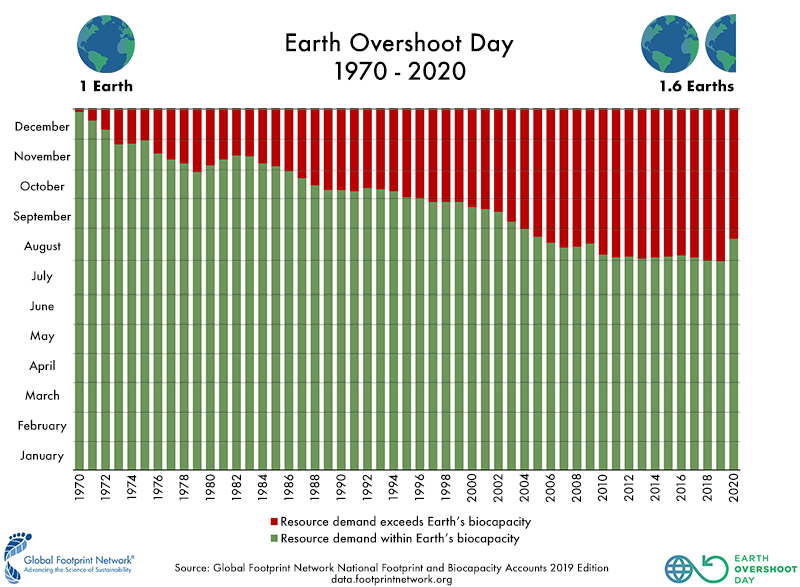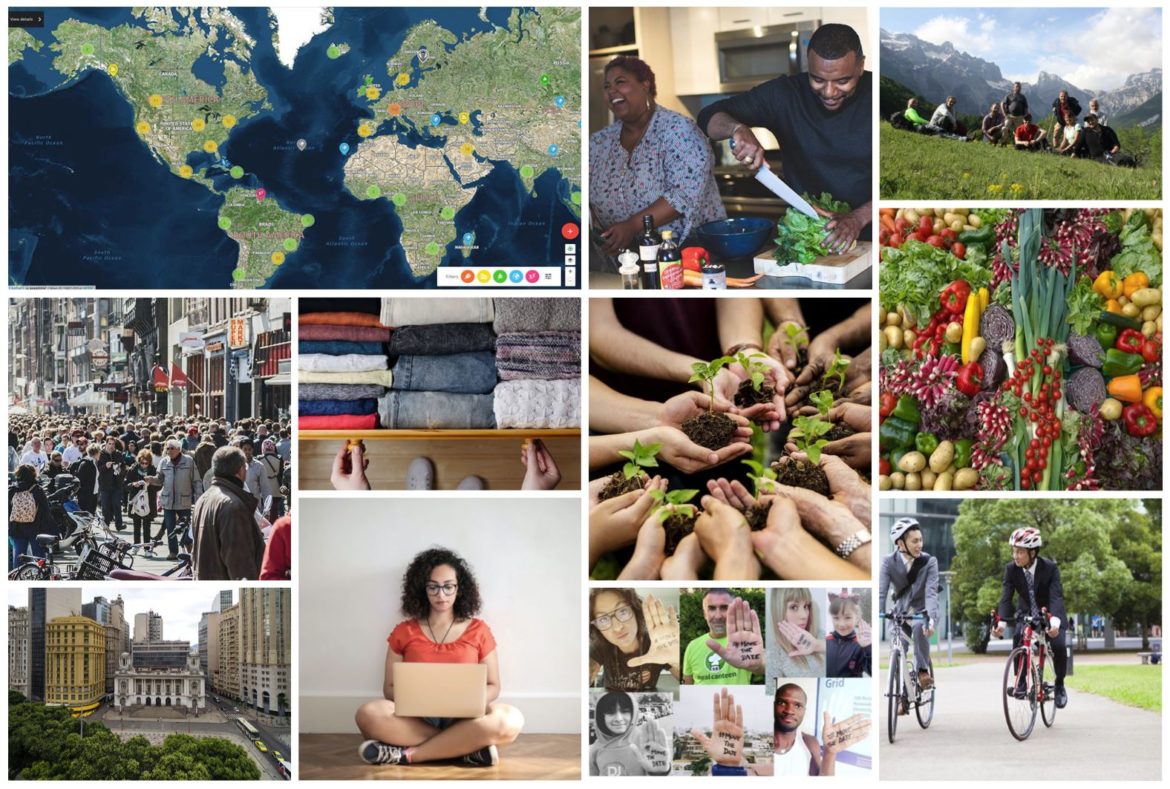Many Pagans celebrate Earth Day on April 22 in support of environmental protection. Some have added a spiritual significance to the date, seeing it as a reminder that we are all her children and we must defend her and support her healing. Yesterday, however, we celebrated a lesser-known event that marks an annual exhaustion of Earth’s bounty for the year.
Earth Overshoot Day [EOD] is not a fixed day. It is calculated every year, and it represents the moment in the calendar when we humans go over-budget on Earth’s resources. According to the Global Footprint Network, Earth Overshoot Day “marks the date when humanity has exhausted nature’s budget for the year. For the rest of the year, we are maintaining our ecological deficit by drawing down local resource stocks and accumulating carbon dioxide in the atmosphere.”
From today forward, we are operating in a budget deficit.
The use of a calendar date is to illustrate the rate of impact of human consumption of resources. Fixing a date each calendar year demonstrates its connection to the budget process.

Earth Overshoot Day via Footprint Network [Twitter]
The day came into being through the work of ecologists William Rees and Mathis Wackernagel, the latter of whom is the founder and president of Global Footprint Network. Rees, an emeritus professor and former chair of the University of British Columbia’s School of Community and Regional Planning, originated the idea of an “ecological footprint,” that is, the amount of natural resources required to support a community or an economy.
Wackernagel, then Rees’ graduate student, co-developed a method relating global consumption to environmental resources as a means to sustainable socio-economic development. The result of the research was published in the landmark text Our Ecological Footprint: Reducing Human Impact on the Earth.
The text describes a ratio of the Earth’s biocapacity divided by the world ecological footprint. The Earth’s biocapacity refers to the amount of natural resources generated by the planet in one year. The world’s ecological footprint represents humanity’s consumption of those resources.
If the ratio is one, then human consumption of resources is in balance with Earth’s capacity to produce those resources. Any number below one expresses a percentage that shows consumption exceeding availability. Multiplying that percentage times 365 days per year results in the number of days within a calendar year before the balance exceeds and the human economy operates in a deficit in regard to the Earth’s resources for that year.
Global Footprint Network has been calculating EOD since its inception. The calculation has been very influential in guiding the environmental policies of nations as well as the strategies of non-governmental organizations and for-profit corporations around the world.
It has also been acquiring important partners elevating the message of EOD, like the World Wildlife Fund, the Earth Day Network, and even Barilla, the pasta brand.
The day has been criticized as a publicity stunt by some scientists. They note the calculation of biocapacity at a global level is a challenging process and suggest that the result of these ratios implies a precision that is not supported by the available science or the strategies used to assess the values used in the ratio.
Nevertheless, critics conceded a few points: “It is possible to apply the EF on a variety of spatial scales from cities and countries up to the global level,” note the authors of “Does the Shoe Fit? Real Versus Imagined Ecological Footprints.” “On a national scale, it compares the domestic footprint of consumption with domestic biocapacity.”

via Footprint Network [Twitter]
While the researchers suggest that more robust science be undertaken to develop the calculation of EOD’s biocapacity indicators, they underscore the value of tools like EOD to support environmentalism: “The motivation behind the concept is sound—we must account for, and quantify, the impacts of humanity on Earth’s ecosystems if we are to manage the planet sustainably for the benefit of both human well-being and our natural heritage.”
As for EOD this time around, like just about everything else, 2020 has been different.
EOD took place almost 3 weeks later than initially projected. In their press release, Global Footprint Network wrote, “Earth Overshoot Day 2020 lands on August 22, more than three weeks later than in 2019, according to Global Footprint Network. The date reflects the 9.3% reduction of humanity’s Ecological Footprint from January 1st to Earth Overshoot Day compared to the same period last year.”
From reductions in CO2 emissions from fossil fuels to lower levels of wood consumption and reduced rates in deforestation, the global COVID19 pandemic, and the lockdowns to curb the spread of the disease around the world, have stunted humanity’s use of Earth’s resources.
But the impact of the pandemic was also segmented, noted the report from Global Footprint Network. The 14.5% decrease in the carbon footprint occurred from a decrease of travel and a reduction in demand for forest products.
Nevertheless, humans collectively use 60% more than what can be renewed by the planet. Even if not as accurate as hoped, EOD gives us a sense of our balance with the planet and a tool to consider how we might better live in equilibrium with nature’s resources.
“Humanity has been united by the common experience of the pandemic and shown how intertwined our lives are. At the same time, we cannot ignore the deep unevenness of our experiences nor the social, economic, and political tensions which have been exacerbated by this global disaster,” said Global Footprint Network CEO Laurel Hanscom. “Making regeneration central to our rebuilding and recovery efforts has the potential to address the imbalances both in human society and in our relationship with the Earth.” has the potential to address the imbalances both in human society and in our relationship with the Earth.”
The Wild Hunt is not responsible for links to external content.
To join a conversation on this post:
Visit our The Wild Hunt subreddit! Point your favorite browser to https://www.reddit.com/r/The_Wild_Hunt_News/, then click “JOIN”. Make sure to click the bell, too, to be notified of new articles posted to our subreddit.
